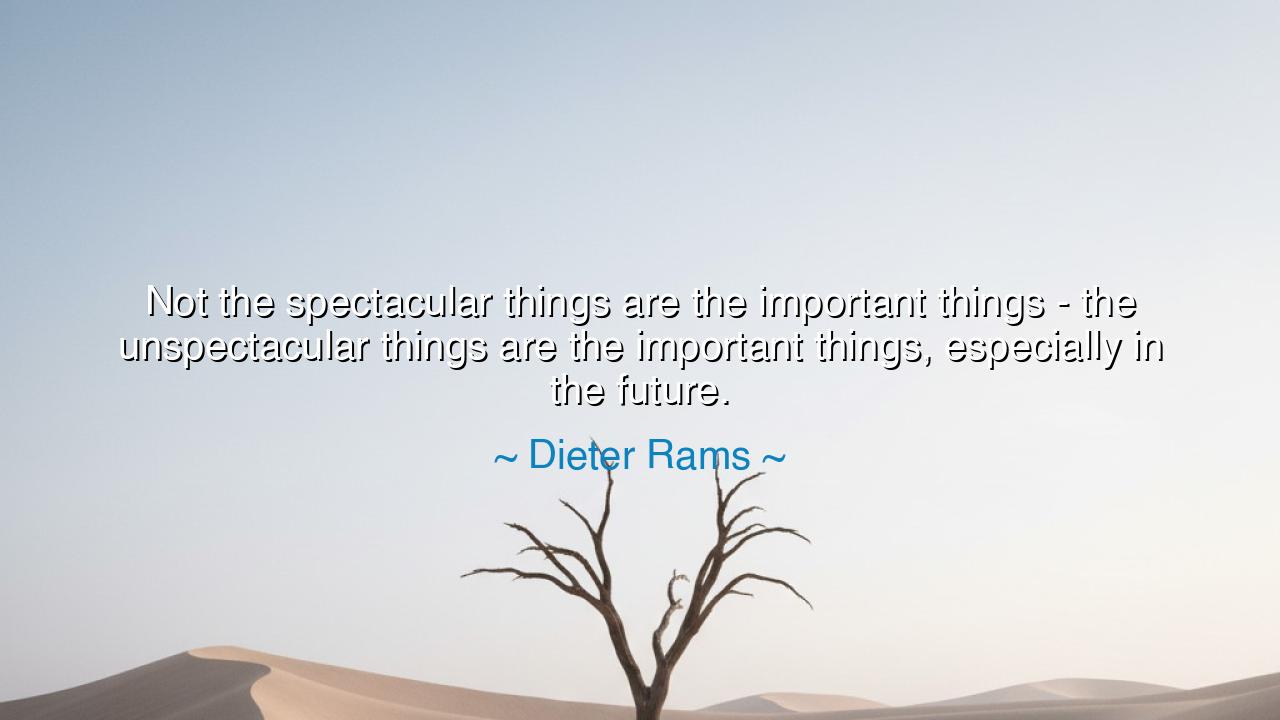
Not the spectacular things are the important things - the
Not the spectacular things are the important things - the unspectacular things are the important things, especially in the future.






"Not the spectacular things are the important things - the unspectacular things are the important things, especially in the future." These profound words by Dieter Rams touch upon a truth that, though simple, is often overlooked in our pursuit of greatness. In a world that celebrates the grandiose, the shiny, and the immediate, Rams calls us to turn our gaze toward the quieter, less dramatic aspects of life—the unspectacular things that hold far more significance than we realize. In the rush to achieve fame, fortune, and recognition, we often miss the deep, meaningful actions that shape the core of our lives and our futures. It is in the mundane and the uncelebrated where true value lies, for it is these things that endure, silently contributing to the future we will build.
This lesson is not a new one, for it has been echoed by great minds throughout the ages. Consider the teachings of Confucius, who emphasized the importance of virtue and integrity in the smallest actions of life. To Confucius, the everyday choices we make—how we treat others, how we maintain our character, how we behave in moments when no one is watching—are the things that define us. It is not the grand acts of heroism, but the unspectacular actions of kindness and respect that create a life of meaning and honor. In this, Rams' words resonate deeply with Confucius’ wisdom, suggesting that the quiet, uncelebrated moments of life are the very foundation of a prosperous future.
In ancient Greece, Aristotle echoed a similar sentiment in his writings on ethics. He argued that it is not the rare moments of brilliance or extraordinary deeds that form the essence of a good life, but the daily practice of virtue. A person who is consistently just, kind, and wise, even in small, private matters, is living a life of excellence. Just as the Socratic method focused on asking the right questions in the simple exchanges of conversation, so too did Aristotle believe that the small decisions—the seemingly insignificant choices we make each day—shape our character and, ultimately, our future. In this light, Rams' quote invites us to reflect on the power of these small moments, which, though unspectacular, are the very essence of the future we are building.
Rams himself, as a designer, understood the significance of simplicity. His minimalist approach to design, characterized by clean lines and understated elegance, stands as a testament to the belief that the unspectacular can hold great power. In a world where design trends often celebrate complexity, spectacle, and visual stimulation, Rams’ philosophy was to focus on functionality, clarity, and lasting value. His designs, though simple, were built to endure, to serve people without drawing unnecessary attention to themselves. Like the small, consistent acts of goodness in daily life, Rams’ work emphasized the value of simplicity—how something that appears plain and understated can, in fact, be far more impactful than anything elaborate or showy.
Consider the life of Mahatma Gandhi, whose humble actions of nonviolent resistance and his commitment to truth and simplicity inspired millions. Gandhi's most powerful moments were not those of grand speeches or dramatic victories but in his everyday decisions—how he chose to live simply, how he spoke with respect and humility, and how he embodied the unspectacular values of nonviolence and integrity. Gandhi’s actions were not spectacular in the traditional sense, yet they changed the course of history. His life teaches us that the most impactful change often comes not through spectacular deeds, but through the quiet strength of small, meaningful actions that accumulate over time.
The lesson of Rams’ words is both a call to mindfulness and a reminder to focus on what truly matters in the long term. In the future, it will not be the fleeting spectacles of modern life that define us, but the quiet, steady accumulation of simple, virtuous acts. Whether in our relationships, in our work, or in our communities, it is the unspectacular things—listening patiently, acting with integrity, treating others with kindness—that create the lasting foundations of a meaningful life. It is these small acts that shape the future, not the grand gestures or the moments that briefly capture attention.
Thus, let us take this wisdom into our own lives. Focus on the small things, the seemingly insignificant actions, for it is in these moments that true character is formed. Practice patience in the face of adversity, humility in moments of success, and kindness when it is least expected. Let us not be seduced by the chase for spectacle and grandeur, but instead seek to cultivate a life rooted in the steady, unspectacular rhythms of virtue and service. The future, as Rams wisely suggests, will be built on these quiet moments of integrity, simplicity, and love. Let us, therefore, cherish them, for they hold the true power to shape the world to come.






AAdministratorAdministrator
Welcome, honored guests. Please leave a comment, we will respond soon